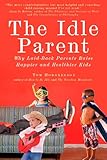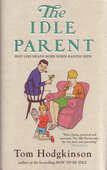Is there such a thing as too much success? I don’t mean monetary success, so please refrain from hollering, “Heck no!” I mean in the realm of parenting, is it possible to do such a bangup job on one particular aspect of the molding of these young minds that it ends up biting you roundly in the behind? It’s beginning to feel that way around here, and it all started with a book.

 I’m still a big fan of the book in question, The Idle Parent, by British writer Tom Hodgkinson. In fact, it’s been my constant companion for the past year. (Hodgkinson first wrote How to Be Idle in 2005, a wonderful tome that promotes enjoying the now, preferably while lounging on the couch, while letting hopes of future glory rot in the freezer bin. With that book’s quiet success, he was asked to apply his Idler philosophy to the sphere of parenting (he is one). He’ll probably write The Idle Grandparent when he is that, too.)
I’m still a big fan of the book in question, The Idle Parent, by British writer Tom Hodgkinson. In fact, it’s been my constant companion for the past year. (Hodgkinson first wrote How to Be Idle in 2005, a wonderful tome that promotes enjoying the now, preferably while lounging on the couch, while letting hopes of future glory rot in the freezer bin. With that book’s quiet success, he was asked to apply his Idler philosophy to the sphere of parenting (he is one). He’ll probably write The Idle Grandparent when he is that, too.)
It’s not surprising, I suppose, that I would find a friend in a ukulele-playing layabout of an English dad who became a parenting guru rather by accident — I work hard as a mom, but more as a cook and homemaker and vintage-kids-books collector than as a playdate planner and learning-toys buyer and extracurriculars fanatic. Also, American experts tend to raise my hackles with their earnest prescriptions for “solving the problem.” I find life’s never that simple.
The Idle Parent is different.
 To help you get a sense for the book’s contents, take the cover art: The U.K. edition shows two seated adults sipping on cocktails; their Little Jonny is on the ground by their feet, happily shaking the silver shaker, preparing another round of drinks. (The U.S. edition has a decidedly less risqué cover.) Now the book is about much more than imbibing in the comfort of one’s home despite having small children to tend to, but the illustration goes a long way toward setting the tone, which is irreverent and fun, rather old-school (and I mean really old-school: he adores the Middle Ages), and decidedly adult-centric (which at least in his house seems to suit the children just fine).
To help you get a sense for the book’s contents, take the cover art: The U.K. edition shows two seated adults sipping on cocktails; their Little Jonny is on the ground by their feet, happily shaking the silver shaker, preparing another round of drinks. (The U.S. edition has a decidedly less risqué cover.) Now the book is about much more than imbibing in the comfort of one’s home despite having small children to tend to, but the illustration goes a long way toward setting the tone, which is irreverent and fun, rather old-school (and I mean really old-school: he adores the Middle Ages), and decidedly adult-centric (which at least in his house seems to suit the children just fine).
The book’s advice ranges from the simple and witty (i.e., If you have a hard time keeping your house clean, switch to candlelight and you won’t notice the dust!) to the outright heretical but wonderful nonetheless (e.g., Keep any and all animals as pets as long as they can live in the barn and they contribute to the family operation in some way. There’s probably a cat exception. There’s always a cat exception.)
I particularly like how he trusts children to do interesting things on their own — he proposes that without the constant (helicopter-parent) intervention and stimulation that are so de rigueur, kids quickly build elaborate play worlds where adults are unwelcome and English is at best a third language. (Kim John Payne, author of another less-is-more book, Simplicity Parenting, calls this kind of activity “deep, creative play.”) Meanwhile, Big People can get up off the carpet and be, well, adults. They have time and elbow room sufficient to make dinner, throw in a load of laundry, sip a glass of wine, even run for public office or have sex. Just kidding.
It’s very aspirational, this book — there are tons of suggestions that sound lovely on paper but are either better-suited to older kids whose parents have super-flexible schedules, or can only be simulated in the English countryside, which is where Hodgkinson resides. But I like aspirational stuff — I like wishing that I could let the kids have a pony so they could use it to sell wagon rides on the weekend. Just the notion makes me smile in a devilish sort of way. What would the neighbors think? Who cares! And it sounds much more fun than playing yet another game of Candyland or building our umpteenth Lego tower “up to the ceiling.”
And sometimes what felt aspirational only yesterday feels within reach today — such as our sleep-in experiment (see page 94 in the book). Like good Idle Parents, Jon and I recently suggested to the girls that they might like to make breakfast “all by themselves,” then get dressed, wash their face and brush their teeth, and watch cartoons while Mommy and Daddy stayed in bed. “What do you think?” we asked. They hopped up and down and answered, “Yes, yes!” and “We’d love to, Mom!” which is how Lola my five-year-old talks.
And the odd thing is, it actually worked. Jon and I stayed in bed until the magical hour of 8:15 (normal wakey wakey is at six on the dot, courtesy of Lola the Clock Watcher). It’s not something we do every day — we can’t, of course — but that it now happens occasionally with only some spilt milk and errant Oatios to show for it opens up a world of other, future possibilities.
“Children, make my bed please.” “Kiddos, have dinner on the table at 5:30 please.” “Dearheart, can you drive yourself to school today? Oh, and pick up some milk on your way home?” (Sounds dreamy right? You should know, Hodgkinson supports bringing back child labor, at least in the home. And I’m right there with him.)
Of course, my kids are not quiiite ready to drive (nor am I ready for them to be ready) and I don’t yet want to teach Lola how to make a gin and tonic (I did give her the recipe for my post-run smoothie but when she made one it was so viscous and odd-tasting that I abandoned the project). But I give my Idler book a big hug for bucking our stateside Be Perfect Do Everything Under the Sun child-rearing culture. His answer to almost all of our must-do’s and have’s — from Tae Kwon Do classes to elaborate gadgets and extravagant vacations — is a firm but friendly “Don’t do it!” Just stay on the couch to ponder life, offering the occasional tickle to the kiddies as they run on by. Kids need much less of everything than we think.
But here’s the rub, at least for me: Even as I’ve been working to become more Idle (it sounds like an oxymoron, but it’s not), creating the environment in which my two girls can thrive and lose themselves in their “work” which is play, a funny thing has happened, and quickly. My increasing success as Idle Parent Extraordinaire has coincided with their starting kindergarten and preschool at our local public school, which means they’re gone all day and when they come home they plunge directly into their pretend play with nary a “Hi, Mom!” hollered in my direction. I wanted a break, a breather; I wanted them to feel more resourceful and Big Girl. But it’s like they’re ready for their own apartment already.
My girls seem pretty well-adjusted (most days) and I dare say this wild experiment called parenting is going well (for now). But as an until recently full-time mom of one girl who was extremely emotionally needy and clingy and the other who was just plain young and helpless, this quick and drastic change in my mommy workload is jarring to say the least. I feel proud of who they are becoming, and even accomplished as a parent (again, most days), but lately I’ve been feeling rather bereft, like the Velveteen Rabbit, deaccessioned, pitched on the old-toys pile, hardly noticed except at mealtimes and for trips to the park.
It’s worth it, I know. As my dear friend Deb reminds me, what’s good for the kids often hurts mom the most. And I try to remind myself that I certainly did chafe, in my old, un-Idle life, at the relentlessness of mothering, at the staggering levels of sacrifice, work, and gentle tending, often asked for just at the moment that I was fresh out of pep. I am more myself these days, more free to have a dance party in the kitchen, read a book in one month instead of six, try out a Chinese beef stew recipe I saw in a magazine, write this essay, even. But I think I’ll always carry with me a nick of nostalgia for those Mommy-centric days, those messy, intimate (too intimate, really) days running into nights, riding the roller coaster on a track that often felt like it was one more ride away from collapse… those unending loops of time that added up to (American-style) early parenting.
I’ll just have to find other thrills. And when I do, maybe I’ll invite Lola and Lucy along. When they get back from their imaginary boat trip to China.









